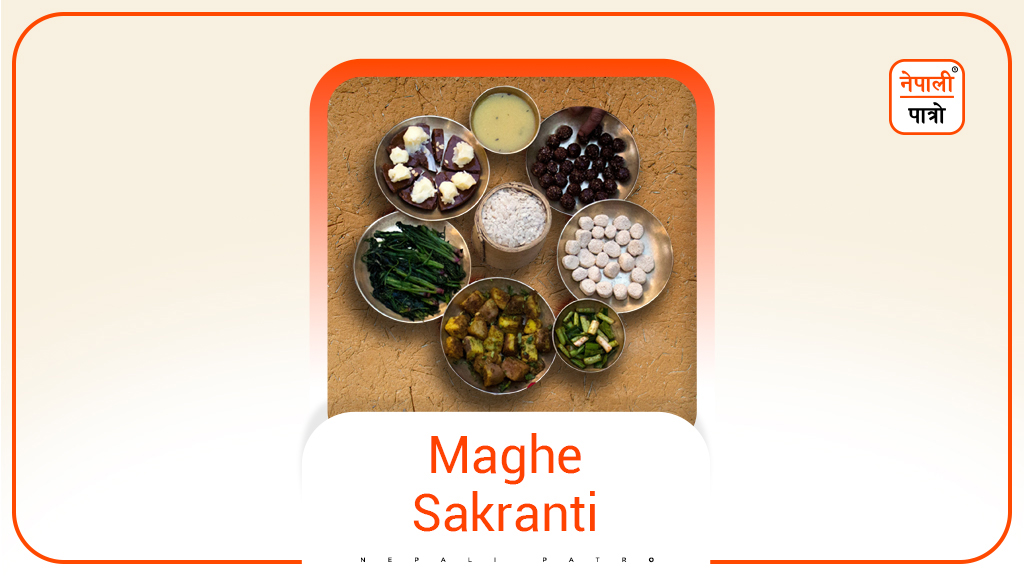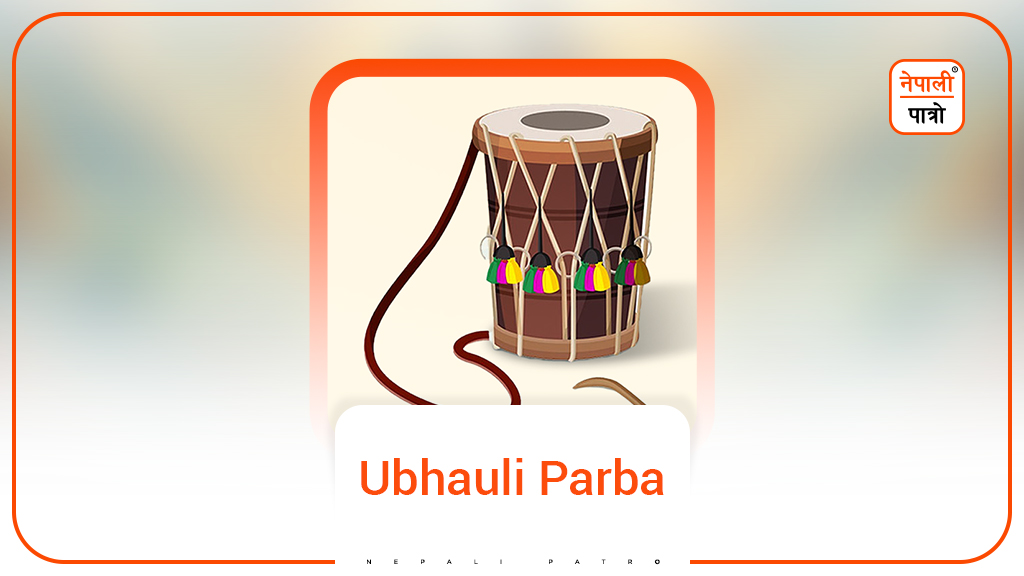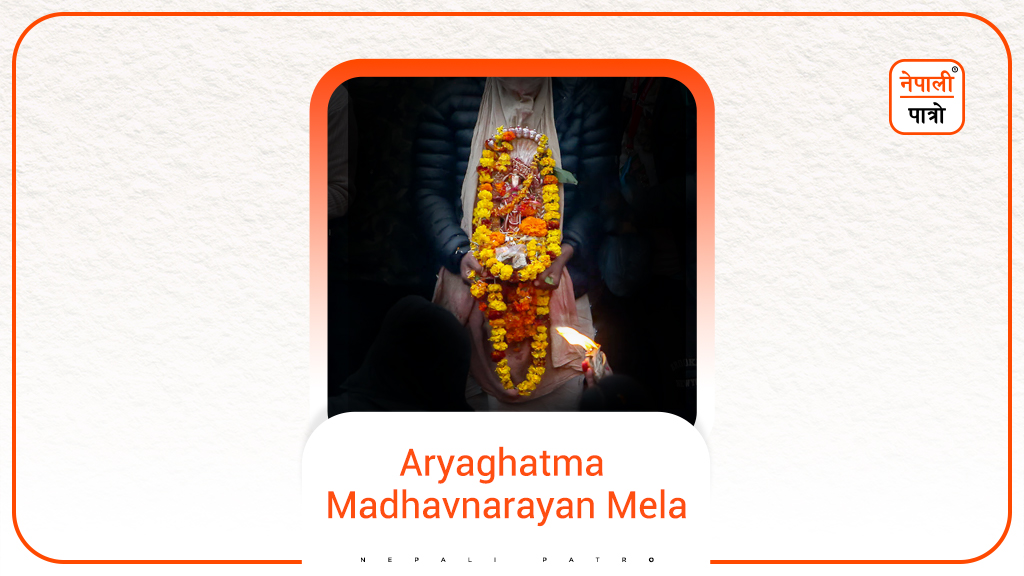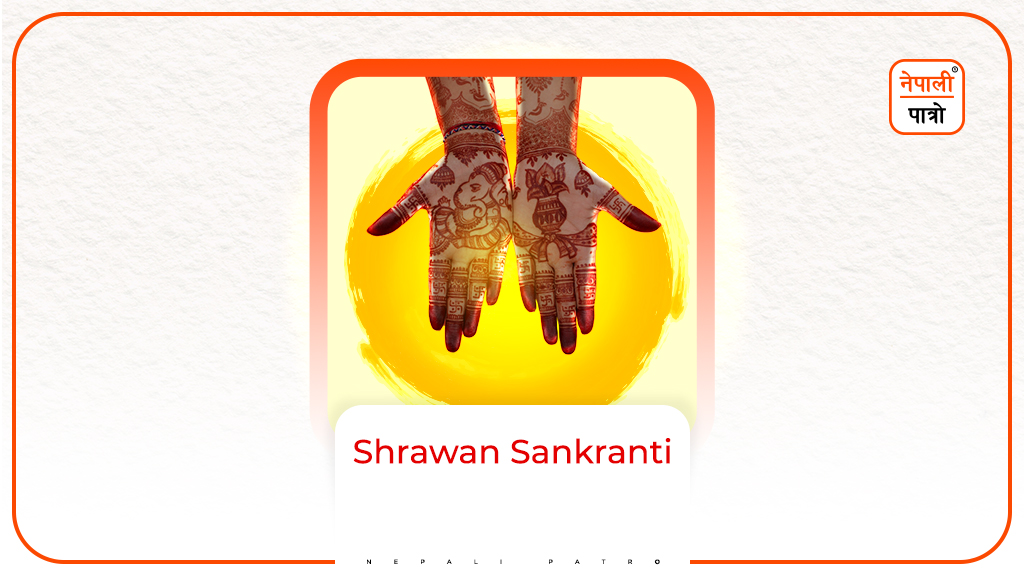
Makar Sankranti | Maghe Sankranti
The process of the sun, moving from one zodiac to another is called Sankranti. According to astrology, the time that the Sun enters Dhanu (Capricorn) from Makar (Sagittarius) is called Maghe Sankranti / Makar Sankranti / Ghya: Chaku Salhu. The tenth solar month begins with the Makar Sankranti. Suryanarayana (the sun) passing a certain zodiac sign or entering a different zodiac, or a certain amount of time from the time of admission is considered a special virtue. In the morning one should bathe and perform donations, charity, etc.
रवेः संक्रमणं राशौ संक्रान्तिरिति कथ्यते।
स्नान–दान–तपः–श्राद्ध–होमादिषु महाफला।।
Rituals of a bath, and donations with devotion, rituals, worships, fire worshipping, fasting, etc. are considered important during this transition period of Maghe Sankranti/ Makar Sankranti.
Holy deeds done during Sankranti as bathing, donation, tenacity, shraddha, fire worship, fasting, etc are considered important. Despite the importance of all the transitions, the one of Makar Sankranti to Uttarayan and when the Karkat Sankranti begins, both of these are viewed with special importance. Aayan is the way. From the day of Makar Sankranti, the sun (Suryanarayana) takes the southern path (Ayan), thus this is known as Utarayan Sangranti also. The day of the gods begins with Makar Sankranti, while Suryanarayana (the sun) begins the day taking its southern path, ie Karkat Sankranti and from The Karkat Sankranti, or the Dakshinayan the night of gods begins. With the passing of Uttarayan, in the Northern Hemisphere of the earth, the day starts to grow longer and the gods are awake, thus all Vedic and religious acts are performed during this time. Bathing is especially important in every transition. It is best to go to the Gangaa (Ganges/ Varanasi) pilgrims and bathe during this kind of festival like Makar Sankranti. The purpose of bathing is not just to wash the dirt. Its importance is directly linked to religion (Sanatan Dharma). Religion is considered as an instrument of happiness in this life and even in the afterlife. There is a classical concept that “If you need happiness, then be religious, if you do not, then do not be religious”.
There is a definite timetable for doing different rituals in order to get different fruits and merits. Therefore, the festivals, including dates specified by the scriptures on special constellations movement, special days, and Sankranti’s, are particularly and especially fruitfully religious. Among such festivals of Sankranti, Makar Sankranti is the king of Sankranti. The baths, donations, chanting of mantras, tenacity, fasting, and worshipping are of great importance performed during this Sankranti. The transition is usually 6.4 hours, which is considered a special time of merit. The time of merit sometimes is before the transition and in some cases are after the transition. It is said that the time of merit of Makar Sankranti will last for 16 hours after the transition. Therefore, when the sun enters the Makar (Sagittarius) the 40 ghadis meaning 16 hours are considered to be the time of merit for the bathing, donations, alms, etc to be performed. But, they should not be performed before the transition of after the transition. या याः सन्निहिता नाड्यास्ताः ताः पुण्यतमाः स्मृताः। If the transition has taken place during the night time then the period of merit will be the day after it. This year the morning of Magh 1, the transition is at 07:55 A.M thus all good merits done just after this time is considered to be fruitful.
Makar Sankranti | Maghe Sankranti Solstice Bath Method
One should go to the holy river, the union of rivers, lake or ocean, or other holy places and perform a holy bath with oath invoking the holy pilgrims.
Commitment/oath (Resolution Sentence) to invoke holy pilgrims:-
पूर्वसंकल्पसिद्धिरस्तु। अद्येह … गोत्रोत्पन्नः सपरिवारयुतोऽहं मम समस्त–पाप–क्षयपूर्वकं अद्य मकरसंक्रान्तौ … तीर्थे (गृहे)) गंगादितीर्थावाहितेन अनेन जलेन मकरस्नानादिजन्य–शास्त्रोक्तफलप्राप्त्यर्थं मकरसंक्रान्ति–सहित–नित्यस्नानञ्चाहं करिष्ये।
After this oath or resolution sentence, one should invoke the holy pilgrims in the water of the holy place.-
गंगे च यमुने चैव गोदावरी सरस्वती।
नर्मदे सिन्धु काबेरी जलेऽस्मिन् सन्निधिं कुरु।।
While taking a holy bath, reciting this mantra, one must invoke the holy Ganges and other holy pilgrims. The baths taken while the stars can be seen in the sky are considered to be the best and with the best merit. The holy baths taken when the stars are invisible or near dusk are considered to be normal and the bath performed after the sun has risen is considered to be of a very low category or merit.
उत्तमं तु सनक्षत्रं मध्यमं लुप्ततारकम्।
सवितर्युदिते भूप ततो हीनं प्रकीर्तितम्।।
Therefore, bathing in virtue or merit time is most fruitful. While bathing after the completion of virtue time is religiously fruitless.
Apart from those who are physically sick or disabled, all other should bathe with cold water. According to the scriptures, those who are physically fit with all body parts do not receive special fruits when they bathe with hot water.
उष्णोदकेन वा स्नानमशक्ये सति कुर्वते।
दृढेषु सर्वगात्रेषु उष्णोदं न विशिष्यते।।
All the male-female, Brahmachari (celibacy), the householder, the Vanaprastha, the monk, the child, the young, and even the impotent, share the great virtue while bathing at the holy pilgrimage. If one has reached the pilgrimage while mothers, fathers, wives, sons, etc, have to stay home with a disability, one should perform bathing on their name 10 times, which will be equivalent to 1 bath by them in the holy pilgrimage, receiving the fruits of good merits. Therefore, it is advisable to take a bath in their name 10-10 times. If you go to the Gangaji pilgrimage and take a bath then you should not wash your clothes at the pilgrimage site. One should wash them in the place of residing or if not they should be washed out of the holy water in a way that the dirty water will not get mixed with the holy place. One has to rinse out a palm full of water, assuming that one has drained the contaminated water during the bath. After bathing, the clothes should be washed only after chanting the Gayatri mantra, performing offering water to the sun, etc. After the bathing rituals, clothes, grains, pulses, and rice, sweets, potatoes, fruits, and alms should be given in donation. Pulses, rice, flour, etc should be given as a donation to the Brahmin or the poor which will be of great merit and virtue. One who does not perform the holy bath during this transition is said to be sick and destitute for seven births.
रविसंक्रमणे प्राप्ते न स्नायाद्यस्तु मानवः।
सप्तजन्मसु रोगी स्यान्निर्धनश्चैव जायते।।
During the Makar Sankranti / maghe Sankranti bathing in places as Prayag, Kashi, and Haridwar in India, especially baths in Ganga Sagar is considered to be highly meritorious. The place where Bhagirath brought Ganga on earth and rescued his ancestors is flocked by people for a holy bath. In Nepal, Kankai, Saptkoshi, Chatara Dham, Barahachetra, the lakes of Janakpur, Devghat, Trisuli, Bagmati, the area of Ridhi, Gandaki, and rivers, lakes, ponds, or union of rivers are full of believers, worshippers who reach there for the holy Makar bath. External and internal relaxation plus peace can be found in religious baths taken on these days.
After a holy bath, donations, and tenacity all except the mother-to-be, should also observe fasting during the Sankranti. In the same way, the offering and worship to the deceased, for their well-being, and also a statute of consecration for the sake of the gods are to be done. First, worshipping the deceased must be done before performing holy rites to the gods and goddesses. At the beginning of the Uttarayan, it is the duty of all human beings to worship and make fire worships in order to show their gratitude to the Gods who look after the welfare of the entire universe. Special scriptures mention of using sesame oil lamps offering at the temple of Lord Narayan and Shiva, as a great virtue for today’s merit.
Especially during the Makar Sankranti day, special fire worship consisting of 108 offerings must be made to lord Bishnu. Lord Madhav-Narayan is the main deity of this festival. (After bathing Makar bath at Prayag, Allahabad, India, it is a tradition to visit Madhav-Narayan on the other side of the river). Including the worshipping of the patriarch with fire worship, Tika, Tilak, and sweets are taken as a holy offerings. Including this, sweets made of sesame seed, sweet potatoes, ghee, molasses, khichdi (rice mixed with cereals and pulses), etc are offered to the gods and eaten as an offering the festival is bid farewell.
In the month of Magh, according to the holy scripture, donating ghee, garments, blankets, etc gives eternal fruit. Because of the importance of sesame seeds during this month, Ekadashi of Magh Krishna is also known as Shattila Ekadashi. The belief is that during the month of Magh bathing with sesame seeds, applying sesame oil on the body, consuming sweets made out of sesame seeds, warming the body by sesame fire, and donating bowls of sesame gives a strong body with a long and healthy life. Likewise, it is proven that in this day fire worships with sesame seeds, consuming sweets made of sesame, ghee, molasses, ground potatoes, sweet potatoes, Khichdi (rice boiled with pulses), and donating these articles keep our body free from cold as well as the digestive systems are kept healthy.
Bulbous jungle potatoes, sweet potatoes, etc cure year-long constipation and stomach-related problems and help to keep the body healthy. Consuming sesame sweets, ghee, molasses or varieties made out of molasses prevents the cold and coughs, etc, and helps to improve the immunity power. The Khichdi cooked out of Black pulses, rice, ginger, turmeric, and coriander seeds, are believed to be of great use, and these substances are considered to be multifunctional, so as to prevent cough, gout, and biliary diseases, and to reduce problems of 140 different diseases and increase the benefit of the health for the entire population by suppressing the diseases. Eternal religious believers celebrate Makar Sankranti in different places according to their traditions. The Yoga Day of the Yogis is also celebrated today. Maghe Sankranti has also begun as a Yoga Day, by performing yoga which cleanses the mental status and can lead to the attainment of God through pure yoga. In the Scriptures, the importance of all karma, such as holy baths, donations, chanting, rituals, tenacity, fire worship, good food, etc during this day in the Sankranti is taken to be of great importance. To Read this article in the Nepali Language please click here.


